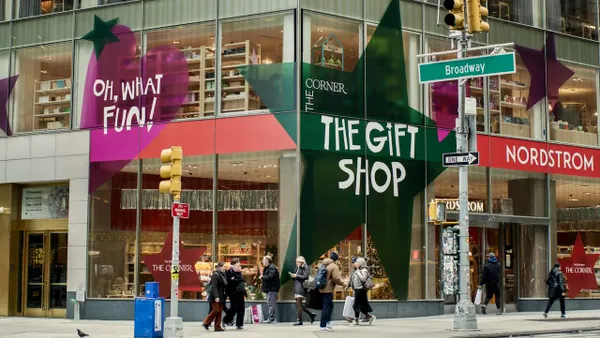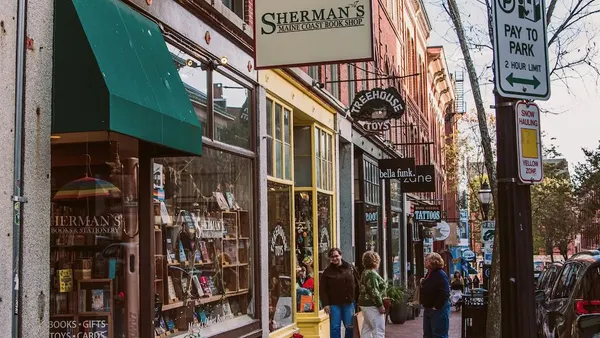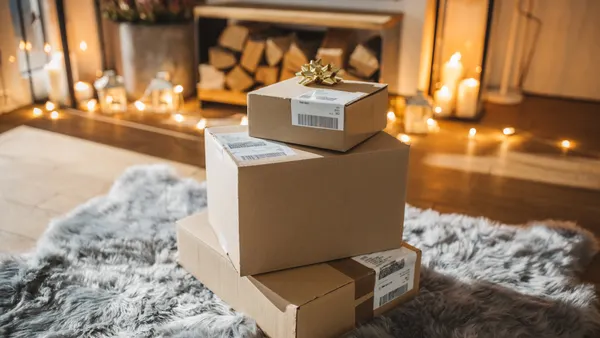Dive Brief:
-
Nearly all (97%) retailers this year delivered orders on their last guaranteed shipping date before Christmas, up from 95% last year — and quite an improvement from the 87% recorded in 2014 — according to Accenture Strategy-owned consulting firm Kurt Salmon's annual Holiday Shipping study, emailed to Retail Dive earlier this week.
-
Retailers were able to keep their promises in part by ensuring they would be easier to keep: At least 20% of merchants either moved their shipping deadlines forward or dropped guarantees due to last-minute weather and capacity concerns. In fact, the average ship date in 2016 was the earliest recorded since the study began — Dec. 20 this year, compared to Dec. 21 last year.
-
Omnichannel options allowed retailers to accommodate last-minute shoppers despite those earlier deadlines. Some customers were able to order as late as 6:00 pm on Christmas Eve for pickup that same night, and many retailers refined their marketing efforts to drive last-minute sales, Kurt Salmon found.
Dive Insight:
Kurt Salmon researchers looked at 32 retailers, including traditional big boxes, specialty retailers and pure-play e-commerce enterprises, all of whom offered free shipping on the orders under the microscope.
Measured on their ability to fulfill customer orders on their last guaranteed shipping date before Christmas, the top three were all luxury brands: Saks Fifth Avenue allowed for Christmas orders as late as Dec. 23, and Coach and Nordstrom allowed standard-shipping orders until Dec. 22. Nine other retailers in the study successfully delivered all orders with a final ship date of Dec. 21.
At least 15% of retailers moved their last ship date forward in the weeks leading up to Christmas, the first time the Kurt Salmon study captured that phenomenon. That helped avoid the crushing snafus and disappointments of previous years, when FedEx in particular complained that late holiday deliveries were the result of not just e-commerce growth but also pie-in-the-sky delivery guarantees from retailers.
But scaling back delivery promises can be risky because late holiday shoppers can be a boon for retailers, and their numbers seem to be increasing. “There will be heightened competition for online shoppers with significant online discounting extending to the Saturday before Christmas,” Traci Gregorski, senior vice president of marketing at Market Track, said earlier this year. “Last year we saw discounts on many hot holiday items at 40% below the Black Friday sale price toward the end of the season.”
Omnichannel services like in-store pickup were key to pleasing those customers, considering that by mid-month, shippers UPS and FedEx were struggling to meet their deadlines. In fact, as e-commerce continues to surge, fulfillment systems must keep up, even when more practical delivery promises are made, according to Steve Osburn, Kurt Salmon/Accenture Strategy Managing Director.
“[R] etailers have to ensure they are operationally competent to deliver on time ... have the ability to change direction at a moment’s notice, and offer flexible delivery alternatives such as ‘buy online, pickup in-store’, or [they] risk customer disappointment,” Osburn said in an email. “Being nothing less than a well-oiled machine at this time of year is simply not an option.”
Osburn noted that many retailers this year managed to pull it off. “While customers may have been surprised by the movement in the guaranteed last shipping date, retailers’ cautiousness paid off with a higher success rate, leaving no one empty-handed on Christmas morning,” he said.
This story is part of our ongoing coverage of the 2016 holiday shopping season. You can browse our holiday page for more stories.















